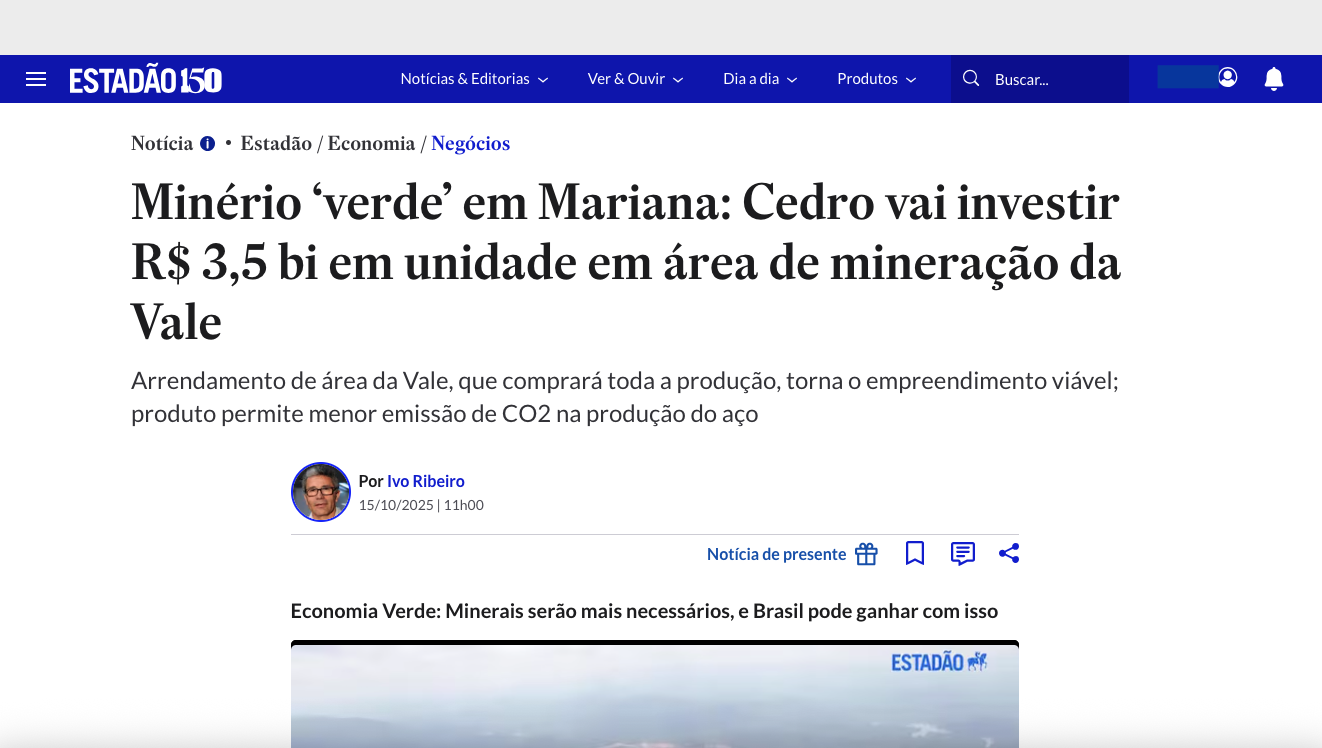The member of the Board of Directors of Cedro Participações, José Carlos Martins, took part on Tuesday (10/06) in the event "Brazil in Transformation: mining in Brazil and abroad", promoted by the Correio Braziliense newspaper, which had Cedro as one of its sponsors.
Among other topics, legislation and regulation in specific areas were discussed. The advance of technology and the use of artificial intelligence were also at the center of the discussion. The agenda also covered mining 4.0, which guarantees the automation of machines, and the integration of productivity and safety mechanisms, with new technological parameters that can give companies and workers more agility and integrity.
In addition to Martins, the debate was attended by the president of the Brazilian Mining Institute (IBRAM), Raul Jungmann; Congressman Zé Silva (Solidariedade-MG) and former Senator and Minister Romero Jucá, as well as other experts in the sector.
The board member of Cedro, headed by businessman Lucas Kallas, said that Brazil has a significant share of the global iron ore market, but is still far from reaching its full production potential.
"Our country has a great mineral vocation. We have continental dimensions and many of our resources have yet to be discovered. Iron ore is perhaps where the country has made the most progress in terms of exploration and knowledge. And our potential is very great."
Mining and conservation
According to Martins, mining and environmental preservation must go hand in hand. "It is possible to reconcile the preservation of caves, for example, with mineral activity," he emphasized. According to him, economic development and environmental protection need to work in tandem, enabling sustainable solutions for the country's growth. In this context, Brazil can increase its competitiveness in the global market.
He gave a historical overview of the country's iron ore industry, going through the fall in Brazil's lead since 2007 compared to Australia. Around 60% of the world's iron ore is produced in Brazil and Australia, while almost 80% of the ore consumed in the world is consumed in Asia.
"Brazil is a country with a great mineral vocation. We have continental dimensions and many of our resources have yet to be discovered. Iron ore is perhaps where the country has made the most progress in terms of exploration and knowledge. And our potential is very great," said José Carlos Martins.
Huge potential
However, in a world that demands more efficiency, more traceability and more sustainability, the segment is now facing the biggest challenge in its history: transforming itself profoundly in order to remain relevant and strategic. According to him, taxation is not the biggest problem for the sector's development in the country. The Cedro advisor argued that the growth potential of Brazilian mining is enormous, but is hampered by regulatory and safety issues.
"If Brazil had maintained the market share it had in 2007, it would currently be producing at least 200 billion tons more iron ore. That means US$20 billion in additional revenue," said Cedro's advisor.
Finally, Martins assessed Brazilian environmental legislation. "Our legislation is very advanced, we usually take what is strictest in the world," he said. "But you can't leave the environmental issue solely to the environmental perspective, it's the country's heritage," he stressed.
Wood production is a complex and vital industry that involves the cultivation, harvesting, processing, and utilization of wood for various purposes. It serves as a cornerstone in numerous sectors.
_optimized.jpeg)
Brasil Mineral website highlights the migration of production to pellet feed, defined by the publication as "premium ore"
Read more
A port terminal and ore with a high iron content, with environmental advantages, are highlighted among the company's investments
Read more
Report talks about the company's new mine in Mariana, which is expected to produce 5 million tons of ore with a 67% iron content annually
Read more